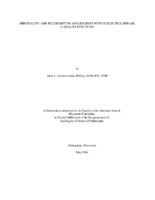Inclusive leadership to guide nursing’s response to improving health equity
View File(s)
- Author(s)
- Details
-
Jacqueline Nikpour (a), Ronald L. Hickman (b), Dora Clayton-Jones (c), Rosa M. Gonzalez-Guarda (d), Marion E. Broome (e) - (a) Center for Health Outcomes and Policy Research, University of Pennsylvania School of Nursing, Philadelphia, PA; ( b) Frances Payne Bolton School of Nursing, Case Western Reserve University, Cleveland, OH; (c) Marquette University College of Nursing, Milwaukee, WI; (d) Duke University School of Nursing, Community Engaged Research Initiative, Duke Clinical Transational Science Institute, Durham, NC; (e) Duke University, Durham NC
- Sigma Affiliation
- Unknown
- Contributor Affiliation(s)
- University of Pennsylvania, Philadelphia, Pennsylvania, USA
Visitor Statistics
Visits vs Downloads
Visitors - World Map
Top Visiting Countries
| Country | Visits |
|---|
Top Visiting Cities
| City | Visits |
|---|
Visits (last 6 months)
Downloads (last 6 months)
Popular Works for Nikpour, Jacqueline by View
| Title | Page Views |
|---|
Popular Works for Nikpour, Jacqueline by Download
| Title | Downloads |
|---|
View Citations
Citations
The vision laid out in the Future of Nursing 2020-2030: Charting a Path to Achieve Health Equity (National Academy of Medicine [NAM], 2021) report made it clear that nurses must be at the forefront of changes designed to improve health equity. This vision builds on the Future of Nursing 2010-2020’s recommendations- addressing intersecting medical and social needs, providing community-based care to marginalized populations, and providing high-quality care for everyone. Yet this time, the Future of Nursing 2020-2030 report even more explicitly reaches beyond the brick and mortar of hospitals and health systems. The mandate asks nurses to stretch as leaders, and as a unified profession to address blatant inequities in our healthcare system. Each nurse must find their place in this exciting vision and connect that vision to the work they do daily. We will need all nurses, across all sectors, backgrounds, and career stages to lead and change processes, systems, and structures to improve the health of all people.
This article is published as part of a supplement sponsored by Academy Health, with support from the Robert Wood Johnson Foundation.
The authors of this work did not submit this material directly to the Sigma Repository. This work is indexed and appears in the Sigma Repository pursuant to a Creative Commons Attribution 4.0 International License attached to the work upon its publication in the journal acknowledged in this record. Please refer to the attached license (the icon at the bottom of this entry) for further information and terms. All terms of the license have been followed. There are no changes in this article from the original posting
| Type | Article |
| Acquisition | Indexed from External Source (Per Rights Granted in Creative Commons License) |
| Review Type | External Review: Previously Published Material |
| Format | Text-based Document |
| Evidence Level | Expert Opinion (nationally/internationally recognized) |
| Research Approach | N/A |
| Keywords | Health Equity; Future of Nursing; Leadership; Community Engagement |
| Publisher | Elsevier |
| Date | 2022-11 |
| Version | Publisher’s Version |
| DOI | https://doi.org/10.1016/j.outlook.2022.02.006 |
| Citation | Nikpour, J., Hickman, R.L., Clayton-Jones, D., Gonzalez-Guarda, R.M., & Broome, M.E. (2022, November/December). Inclusive leadership to guide nursing’s response to improving health equity. Nurs Outlook, 70(6S1), S10-S19. https://doi.org/10.1016/j.outlook.2022.02.006. http://hdl.handle.net/10755/23071. |
| ISSN | 0029-6554 |
License
The following license files are associated with this item:
Related items
Showing items related by title, author, creator and subjects.
-
Intersectionality of intimate partner violence among Chinese women: Analysis of online forums on domestic violence
Cao, Jiepin; Gonzalez-Guarda, Rosa M.This study explores how demographics and Socioeconomic status influences the experience of intimate partner violence of Chinese women via the lens of intersectionality by doing text analysis of a Chinese forum on domestic ... -
Prevalence and predictors of intimate partner violence in Mexican and non-Mexican Hispanic women from SEPA
Montano, Nilda (Nena) Peragallo; Kim, Young Ju; Gonzalez-Guarda, Rosa M.; Cianelli, Rosina; Villegas, Natalia (2017-07-06)Purpose: The purpose of the study was to examine prevalence and difference of intimate partner violence (IPV) between Mexican and non-Mexican Hispanic women residing in the United States. In addition, this study investigated ... -
Determinants of HIV and STI testing among women experiencing intimate partner violence
Williams, Jessica R.; Gonzalez-Guarda, Rosa M.; Carrington, Cherelle; Lorenzo, Dalia (2016-07-13)Session presented on Thursday, July 21, 2016: Purpose: HIV testing and counseling among high risk populations has been identified as a key strategy to reducing HIV related health disparities (CDC, 2007). There is a growing ... -
Spirituality and religiosity in adolescents with sickle cell disease: A qualitative study
Clayton-Jones, Dora L.Sickle cell disease (SCD) is a serious debilitating chronic illness and global health problem. Spirituality and religiosity have been shown to have positive correlations with their health outcomes. Research addressing the ... -
Spirituality and religiosity as an approach to coping for adolescents living with sickle cell disease: A review of the literature
Clayton-Jones, Dora L.; Haglund, Kristin (2016-03-21)Session presented on Saturday, November 7, 2015: Purpose: The purpose of this presentation is to provide researchers and clinicians with a review of research on spiritualty and religiosity (S/R) in adolescents with sickle ...






